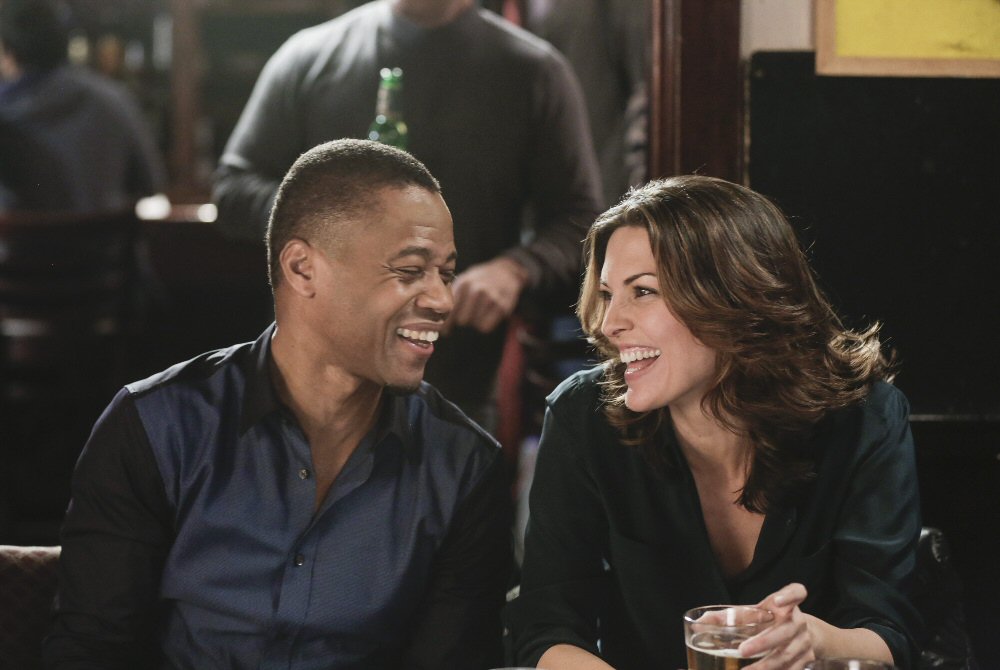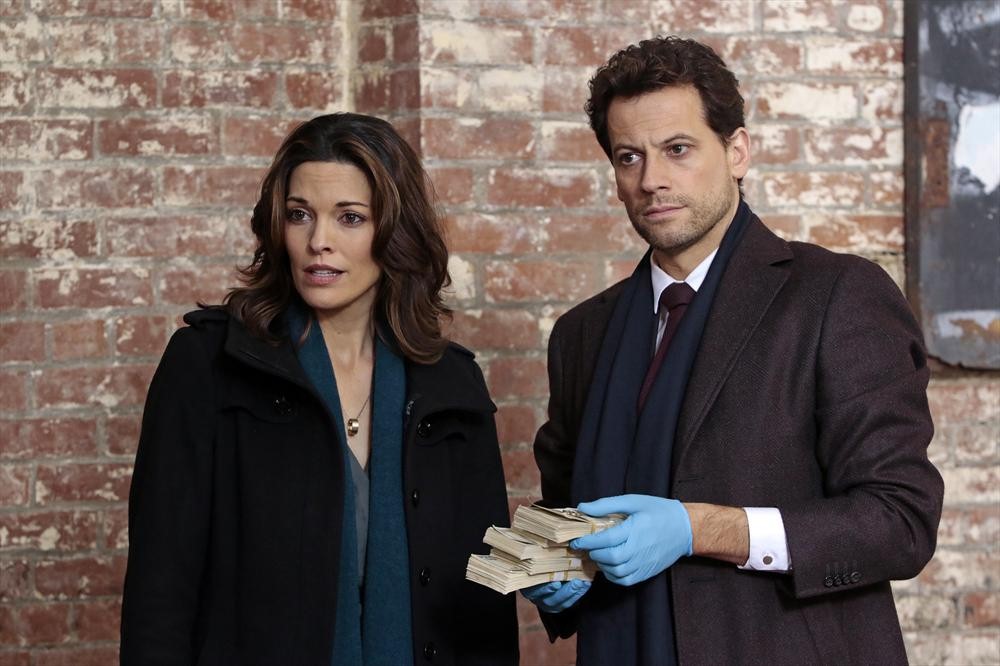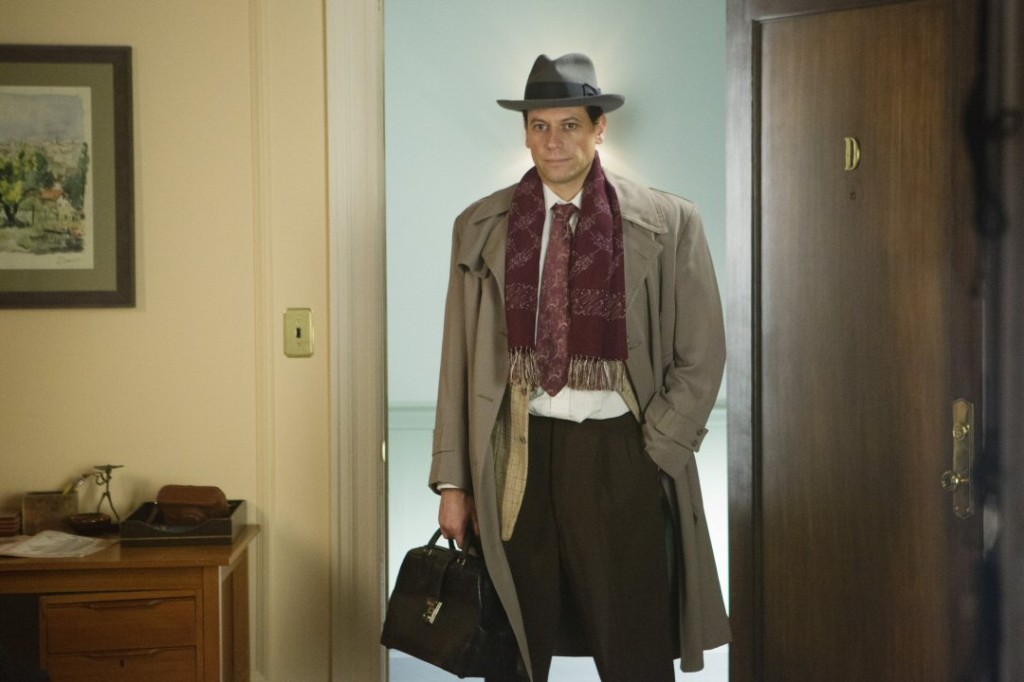Forever, the crime procedural about an immortal medical examiner who lives in New York with his 80-year-old son, is nothing if not a product of our times. When Forever first premiered, I (over-)enthusiastically called that it would have a five season run. With last night’s official cancellation coming just one day after the season finale, I obviously have some words to eat. But even though Forever is condemned to its single season, it may be seen—maybe even more so now—as a show that aptly summarized the television landscape of the mid-2010s. I’m not saying it was a good show, but it was an inevitable show, and I’m ultimately glad for its existence.
Let’s break down the elements that make up the wonder and the glory that was Forever. First, we have a fairly by-the-numbers police procedural. Our protagonist, Henry Morgan (Ioan Gruffudd), is a medical examiner whose Sherlock-esque insights can solve the most impossible of mysteries. He works alongside Detective Jo Martinez (Alana De La Garza), a Mariska Hargitay redux with a tragic past. The crimesolvers are sometimes joined, sometimes hindered by the try-hards in their respective workplaces: Henry’s assistant Lucas (Joel David Moore, plucked straight from the set of Bones), Jo’s partner Mike (Donnie Keshawarz), and an unnecessary but wholly welcome Lorraine Toussant as big boss Lieutenent Reece. At face value, Forever is just the latest in a long and reliable train of popcorn procedurals. And on this level, the show is predictably OK. Its target demographic is your parents, and they like it just fine.
But let’s level up: Henry is also a 200-year-old immortal. We don’t know how, or why, but every time he dies, he disappears and wakes up in the Hudson River (naked, of course, à la Time Traveler’s Wife). As such, Forever makes extensive use of flashbacks to inform Henry’s present. This, originally, was the reason I was so confident about this show’s success: in a TV era when we love the period piece but yearn for constant stimulation, Henry’s multi-century run allows for a smorgasbord of historical drama that’s perfect for the ADHD nature of the modern viewer. A little 1850s pistol dueling here, some 1920s heroin addiction there, plenty of WWII action, even a smattering of truly embarrassing eighties punk–Forever has made decent enough use of its device, and the constant time shuffling gives the show an appearance of literacy, even though the historical stuff has a lot more in common with Vampire Diaries flashbacks than it does Mad Men.
But as Lucas says to Henry when the latter reveals his secret basement lair lab, “Just when I’ve thought you peaked, you just go and take it to a whole new level.” Forever‘s third level was perhaps its most promising, and thus the most disappointing in its mishandling. Early on in the show’s run, Henry acquired a stalker. With his morbid gifts and cryptic messages, the relationship between Henry and 2000-year-old Adam (Burn Gorman) is exciting and scary (even though it’s lifted straight out of the Dexter Season One playbook). But the shimmering terror these scenes evoked in the first few episodes weakened, and then faded entirely as the season wore on. Adam became a convenient bookend to give episodes their cliffhangers, but all of the interesting questions—how does a 2000-year-old man function in the modern world? What does his existence mean for Henry? What are his hobbies, besides killing Henry and parting his hair just right?—aren’t just left unanswered, they’re never asked in the first place.
Adam’s motivations aren’t even prodded at, beyond “he’s evil,” leading us to the unfortunate conclusion that the writers simply never bothered with all that character nonsense. And Adam’s storyline was wrapped up in the finale, rote closure without catharsis of even the slightest degree. On top of it all, Adam’s ultimate fate, as dealt by Henry, was so brazenly sick and uncalled for that I feel very upset that this part of the show even existed in the first place. (Highlight for spoiler: Henry permanently and purposefully paralyzes Adam, so now the immortal man is locked in his own body, conscious but unable to move or communicate, for-literally-ever. Overly harsh for an Auschwitz survivor who only ever killed an unkillable guy.)
Early episodes involved a death-of-the-week for Henry, which grew tiresome quickly, but not nearly as tiresome as when the deaths stopped and Henry just solved crimes like a normal person. The character himself, who started out as a charming, slightly annoying eccentric whose extended life gives him a unique take on problem-solving, rapidly devolved into a paper-thin English Dandy whose most notable character trait is his affinity for scarves. The blame rests perhaps more on the writers than on Ioan Gruffudd, but he is no innocent either. What little character work there is gets split amongst the supporting cast, the biggest slice going to Abe.
Oh, because I almost forgot! Henry has an 80-year-old son named Abe. It’s Judd Hirsch. This is important because Judd Hirsch is important and because it never ceases to be weird and a little gross when Henry kisses him on the forehead. At one point David Krumholtz plays Young Abe and it’s still weird and a little gross but also very important. Abe is our connection to Henry the Man, as opposed to Henry the Doctor or Henry the Immortal, and as such he is crucial to our connection to the show itself.
Henry and Jo must ultimately come together romantically, of course, for such is the nature of the procedural, but while the actors have good chemistry, the characters themselves couldn’t be less sexually charged. The only romance less exciting than this one is the one between Henry and his last wife, the mystery of whom was almost as boring as the woman herself. But I looked forward to Henry and Jo’s eventual consummation because, to be frank, there wasn’t much else to look forward to on a post-episodic level. We never quite got there, but at least Jo finally ditched rival love interest Cuba Gooding Jr. (playing the descendant of a slave Henry once owned, because, of course). A promising moment between Henry and Jo in the last minutes of the finale, while clearly a last-ditch effort to wrap up loose ends for fans, was the first time Forever was given any personal urgency.

Finding this photo necessitated me googling “Cuba Gooding Jr. Forever”, which is actually a sentiment I hold dearly.
Hell, the show just needed plain urgency, in general–despite its layer cake of plot and intrigue, Forever‘s biggest fault is that it was completely and infuriatingly mild. Now that that it’s gotten the kibosh, part of me wants to lay off Forever, and give it a pass before it’s retired to the procedural afterlife. After all, would NCIS deserve this kind of criticism, or Criminal Minds, or any of the CSIs? Their episode-to-episode quality is about equal. But this isn’t CBS, whose success has hinged on its ascent to the #1 network for viewers over 50. This is ABC, goddamnit, home of Lost and Galavant and Agent Carter, and if you’re gonna go high concept, fucking go high concept. I didn’t need you to run forever, Forever, but this wussed-out milquetoast affair wasn’t an embarrassment, it was a downright pity.
But in the beginning of this review I said I was glad that Forever existed, and, despite it all, I am. Because even if it never rose to its potential, Forever itself is a form of potential. Potential for television that blurs the lines between highbrow and lowbrow, episodic and serial, history and modernity, realism and fantasy. Forever is an amalgamation of the best parts of today’s television landscape, and even if this Frankenstein’s monster never came to life, the fact that it ran for a full 22-episode season with this kind of starting point is pretty incredible. So let’s take this one to clear our throats, and go back to the drawing board. It will only get better from here.
Forever and ever, amen.




